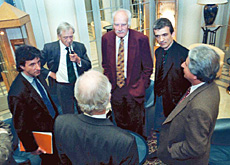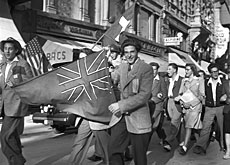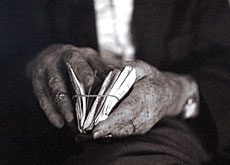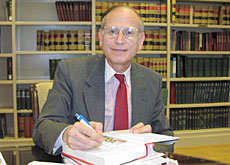Facing up to the lessons of Swiss history

It's ten years since Switzerland decided to take a hard look at its behaviour during the Second World War by creating an independent commission of experts.
The committee, which was set up by the Swiss government and parliament in December 1996 after harsh criticism of the country as a war profiteer, sparked heated debate and scientific research.
During its five years of work, the Independent Commission of Experts Switzerland – Second World War published 25 volumes, some of which were critical of Switzerland’s economic and refugee policies from 1933 to 1945.
The commission’s findings were published as the Bergier report, named after Swiss historian Jean-François Bergier who led the research.
In 1995, 50 years after the end of the war, Jewish organisations began to ask Swiss banks questions about dormant accounts belonging to the victims of Nazism.
“Since the banks were very difficult to approach and out of their depth in their deplorable handling of the crisis, there was an escalation of the criticism which went as far as the government and the Swiss National Bank.
“It reached a climax in 1996,” recalled Hans-Ulrich Jost, a leftwing Lausanne University professor who is renowned for his knowledge of 20th century Swiss history.
Jost chaired a panel in Bern on Friday that took stock of the impact of the Bergier report.
Blackmail
Ten years ago emotions had reached such a high point that then-cabinet minister Jean-Pascal Delamuraz spoke publicly of “blackmail and threat” against Switzerland.
But Jost believes that everything had begun in the 1960s well before international criticism, threatened class action suits and threats of a boycott of Swiss banks in the United States.
“It was even said in this terrible atmosphere of cheating that Switzerland had been impeccable during the war, that the questions raised were all about details and that they had already been adequately dealt with,” Jost told swissinfo.
He confessed to have “laughed a little” himself when he heard Swiss Foreign Minister Flavio Cotti calling for “all the truth”.
“Anyone who had read the history books of the time should have known the truth,” he added.
Parliament approved the setting up of the independent commission on December 13, 1996.
Shed light
And on December 19 the commission was named by the government to “shed light in an exhaustive manner on the role of Switzerland as a financial centre during and after the Nazi regime”.
Rarely had an issue been tackled so promptly in a country that is known for the slowness of its federal system.
At the time, parliament did not discuss the problem in any depth and it was the same when the Bergier report came out just over five years later.
Jost recalls, however, that it was written in the commission’s mandate that there would be a final parliamentary debate. “But at the outset any eventuality of Swiss “guilt” was excluded.”
Bank secrecy in investigating dormant accounts from the period was lifted for five years and the experts could investigate gold and currency transactions of the national bank and other banks, business relations with Germany and the government’s attitude towards refugees.
The pressure was enormous. “There was no reflection on the way to lead historical research and so the proceedings went on in a bureaucratic fashion,” Jost said.
“Urgency does not create ideal conditions but the result is respectable,” Jost commented about the 25-volume final report.
Indifference
Since its publication, articles and books have continued to appear. But Jost is disappointed by the indifference the report has received from both universities and the media.
Jost does not mince his words when he refers to attacks from the rightwing Swiss People’s Party “which openly spoke of burning the Bergier report without anyone protesting”.
“Switzerland does not want to know, even experts do not want to dig too deep,” Jost noted. But he is consoled by the hope that “in 50 years time, young researchers will reread it and can fuel public debate”.
swissinfo, Isabelle Eichenberger
The Independent Commission of Experts Switzerland – Second World War was led by Swiss historian Jean-François Bergier.
The Swiss members: Helen B. Junz, economist (from February 2001); Georg Kreis, historian; Jacques Picard, historian; Jakob Tanner, historian; Daniel Thürer, jurist (from April 2001); Myrtha Welti, Secretary General.
Foreign historians: Wladyslaw Bartoszewski (Poland), Saul Friedländer (Israel/United States), Harold James (Britain).
December 13, 1996: Parliament approved a decree on historic and judicial research into the assets that arrived in Switzerland as a result of the National Socialist regime in Germany.
December 19: The government named the independent commission of experts. They took up their task in May, 1997.
May 1998: Presentation of the intermediate report entitled “Switzerland and gold transactions during the Second World War”.
December 1999: Presentation of the second intermediate report, which concerned Swiss policy towards refugees.
December 19, 2001: The definitive report was handed in.
March 2002: The commission gave the government its final report – 600 pages, which complemented the 11,000 of the 25 volumes published.
The commission was disbanded after a five-year operation that cost SFr22 million ($18.3 million).

In compliance with the JTI standards
More: SWI swissinfo.ch certified by the Journalism Trust Initiative



You can find an overview of ongoing debates with our journalists here. Please join us!
If you want to start a conversation about a topic raised in this article or want to report factual errors, email us at english@swissinfo.ch.